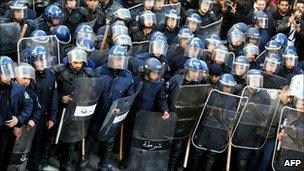Several injured in pro-democracy march in Algiers
- Published
Protesters - some draped in Tunisian flags - joined the rally despite official warnings
Algerian police have broken up an anti-government demonstration by about 300 people in the centre of the capital, Algiers, calling for greater freedoms.
Several protesters were injured and a number are reported to have been arrested. Seven police officers were also hurt, according to state media.
The leader of the opposition Rally for Culture and Democracy (RCD) said those held included its parliamentary leader.
The protest followed rioting in several cities set off by rising food prices.
The government has noted the popular unrest in neighbouring Tunisia, which led to the ousting of President Zine al-Abidine Ben Ali.
Protests in Algeria earlier this month left at least five people dead
There have also been a number of public suicide attempts, echoing the self-immolation of a man in Tunisia that triggered the protests there.
'No permission'
Demonstrations are banned in Algeria because of a state of emergency in place since 1992, and the government had warned people not to attend the demonstration called by the RCD in central Algiers.
"Citizens are asked to show wisdom and vigilance and not respond to possible provocation aimed at disturbing their tranquillity, peace of mind and serenity," it said a statement published by state media.
Hundreds of protesters - some draped in Tunisian flags - nevertheless gathered outside the party's headquarters to march to 1 May Square, chanting "A free and democratic Algeria" and "The authorities are assassins".
At 1100 (1000 GMT) riot police surrounded the crowd and began breaking it up, because the organisers of the rally "had not received permission from the authorities", state-owned Algerian radio reported.
RCD chairman Said Sadi told the Reuters news agency that 32 protesters were injured in the ensuing clashes, including a member of parliament.
Several people were also arrested, including Othmane Amazouz, the head of the RCD's parliamentary group, Mr Sadi said. The AFP news agency said most of those detained were youths, and that some were beaten by police.

Demonstrations are banned in Algeria because of a state of emergency in place since 1992
State radio quoted an official at the General Directory of National Security (DGSN) as saying that "five people had been arrested during this march, while seven policemen had been injured, two of them seriously".
The official added that the RCD "had asked the security services to help an RCD MP who was injured" and that he had received treatment.
Mr Sadi said the authorities had "plunged the capital into a situation similar to the Battle of Algiers" in 1957, when the French colonial authorities brutally put down a revolt led by the National Liberation Front (FLN).
"A government which seeks to oppress its people is not a government," he told the privately-owned newspaper InfoSoir.
"It has to choose between changing peacefully and taking the country towards chaos," he added. "And this is what we want to avoid."
Many Algerians are feeling inspired by what happened in Tunisia, and they believe now it is their turn to press for change, the BBC's Chloe Arnold in Algiers reports.
- Published12 January 2011
- Published23 January 2011